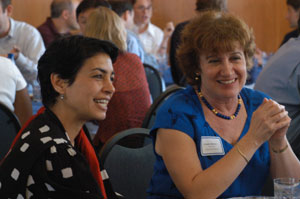New profs take careful notes at orientation
Scholars meet peers and learn the campus ropes at daylong briefing
![]()
| 27 August 2003
| |  Left: Paola Bacchetta, associate professor of women’s studies, shared lunchtime conversation with Christina Maslach, vice provost for undergraduate education. Peg Skorpinski photo |
Teaching and library resources, Big Game lore, research opportunities — and, of course, The Naked Guy. Newly hired faculty received a crash course in “the Berkeley way” (both de facto and de jure) at a daylong orientation Aug. 20. Approximately 60 of the 80 newly hired faculty members from departments across campus attended the event, organized jointly by the Academic Senate and the Office of the Vice Provost for Academic Affairs.
“The university is its faculty,” Chancellor Berdahl said in his welcoming remarks. Despite California’s current financial woes, “you won’t regret” choosing Berkeley, he told the group. Berdahl cited a series of past crises — the Loyalty Oath, the Free Speech Movement, and the economic downturn of the early ’90s — that prompted predictions of Berkeley’s demise. In each instance, he noted, it not only rebounded but placed among the top U.S. campuses in national rankings.
Campus leaders, including Executive Vice Chancellor and Provost Paul Gray, Vice Provost for Undergraduate Education Christina Maslach, and outgoing Academic Senate Chair Catherine Koshland, offered an overview of the Berkeley landscape to a clearly energized and diverse cohort of scholars. According to campus statistics, the newly hired faculty are approximately 45-percent female, 28-percent minority, and 10-percent underrepresented minority.
Teaching, research, public service
Berkeley’s emphasis on teaching, research, and public service was a unifying theme throughout the day. Balancing these three, said Academic Senate Vice Chair Robert Knapp, “is absolutely crucial to your well-being and your career.” He advised new faculty to identify colleagues who are thriving and “learn how they’ve balanced their life.”
Robert Price, associate vice chancellor for research, described the benefits of connecting with other scholars through one of the campus’s many interdisciplinary organized research units. Faculty Development Coordinator Steve Tollefson said the Office of Educational Development can arrange to videotape a faculty member in the classroom, then sit down with the professor to view the tape and offer suggestions for improvement — a prospect that several new professors welcomed as useful, though sometimes mortifying. “You should be allowed to watch in solitude,” said one.
Share governance — but later
The important role of faculty in helping to set campus policies and priorities was another recurring theme. “At Berkeley, you’re asked to think about how a university might run,” said Scott Saul, a new assistant professor in English, of UC’s unique system of shared governance.
Attendees were advised, however, to go slow on involvement in the Academic Senate. Tenure depends, in part, “on evidence of research activity,” noted Elaine Kim, Graduate Division associate dean. “It’s wiser to focus on your research at first, and refuse committee work. We need you to get tenure.”
Human Resources AVC David Moers made a plug for Cal’s women’s volleyball team, cautioned against wearing red during Big Game Week, and offered a snapshot of the Berkeley staff. Despite numerous stresses it has weathered in recent years — reduced numbers, new administrative processes, and revamped financial and payroll systems — the campus workforce is a remarkably dedicated group, he said, that “will provide you unbelievable services” if treated with respect.
“David Moers says to be friendly, and I come along and say ‘not that friendly,’” quipped the following speaker, Assistant Vice Provost for Academic Compliance Sarah Hawthorne, whose topic was campus policies on sexual harassment and faculty relationships with students. Addressing the former theme, she identified three “red flags” for new faculty (indeed, all faculty) to be alert to: if a student reports being sexually harassed, if you yourself experience sexual harassment, and if someone accuses you of sexual harassment. She counseled the fledgling faculty to seek assistance, by notifying a superior, should any of these situations occur.
For a variety of other issues that might arise, a faculty ombudperson, the Senate’s Committee on Privilege and Tenure, and other resources are in place to help, said Knapp. “There are a lot of people in the Academic Senate who are interested in solving problems.”
For visual learners, a multitude of flyers, guides, “quick guides,” brochures, folders, and fact sheets were on hand. Faculty were also encouraged to continue their education in all things Berkeley by visiting the comprehensive “Faculty Guide to Campus Life” website, facultyguide.berkeley.edu.

